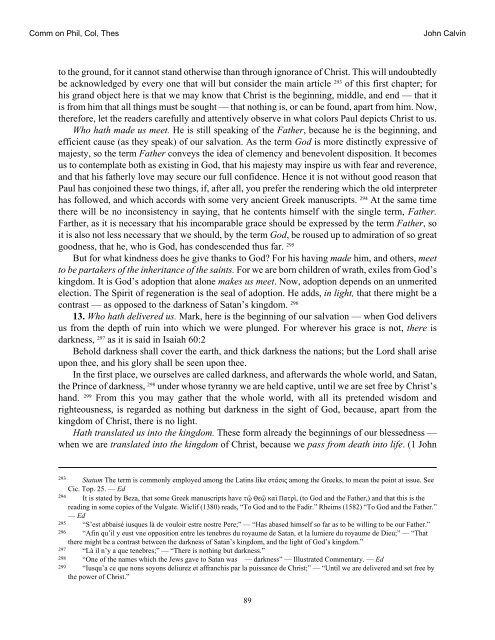Commentary on Philippians, Colossians, and Thessalonians
Commentary on Philippians, Colossians, and Thessalonians
Commentary on Philippians, Colossians, and Thessalonians
Create successful ePaper yourself
Turn your PDF publications into a flip-book with our unique Google optimized e-Paper software.
Comm <strong>on</strong> Phil, Col, Thes<br />
to the ground, for it cannot st<strong>and</strong> otherwise than through ignorance of Christ. This will undoubtedly<br />
be acknowledged by every <strong>on</strong>e that will but c<strong>on</strong>sider the main article 293 of this first chapter; for<br />
his gr<strong>and</strong> object here is that we may know that Christ is the beginning, middle, <strong>and</strong> end — that it<br />
is from him that all things must be sought — that nothing is, or can be found, apart from him. Now,<br />
therefore, let the readers carefully <strong>and</strong> attentively observe in what colors Paul depicts Christ to us.<br />
Who hath made us meet. He is still speaking of the Father, because he is the beginning, <strong>and</strong><br />
efficient cause (as they speak) of our salvati<strong>on</strong>. As the term God is more distinctly expressive of<br />
majesty, so the term Father c<strong>on</strong>veys the idea of clemency <strong>and</strong> benevolent dispositi<strong>on</strong>. It becomes<br />
us to c<strong>on</strong>template both as existing in God, that his majesty may inspire us with fear <strong>and</strong> reverence,<br />
<strong>and</strong> that his fatherly love may secure our full c<strong>on</strong>fidence. Hence it is not without good reas<strong>on</strong> that<br />
Paul has c<strong>on</strong>joined these two things, if, after all, you prefer the rendering which the old interpreter<br />
has followed, <strong>and</strong> which accords with some very ancient Greek manuscripts. 294 At the same time<br />
there will be no inc<strong>on</strong>sistency in saying, that he c<strong>on</strong>tents himself with the single term, Father.<br />
Farther, as it is necessary that his incomparable grace should be expressed by the term Father, so<br />
it is also not less necessary that we should, by the term God, be roused up to admirati<strong>on</strong> of so great<br />
goodness, that he, who is God, has c<strong>on</strong>descended thus far. 295<br />
But for what kindness does he give thanks to God? For his having made him, <strong>and</strong> others, meet<br />
to be partakers of the inheritance of the saints. For we are born children of wrath, exiles from God’s<br />
kingdom. It is God’s adopti<strong>on</strong> that al<strong>on</strong>e makes us meet. Now, adopti<strong>on</strong> depends <strong>on</strong> an unmerited<br />
electi<strong>on</strong>. The Spirit of regenerati<strong>on</strong> is the seal of adopti<strong>on</strong>. He adds, in light, that there might be a<br />
c<strong>on</strong>trast — as opposed to the darkness of Satan’s kingdom. 296<br />
13. Who hath delivered us. Mark, here is the beginning of our salvati<strong>on</strong> — when God delivers<br />
us from the depth of ruin into which we were plunged. For wherever his grace is not, there is<br />
darkness, 297 as it is said in Isaiah 60:2<br />
Behold darkness shall cover the earth, <strong>and</strong> thick darkness the nati<strong>on</strong>s; but the Lord shall arise<br />
up<strong>on</strong> thee, <strong>and</strong> his glory shall be seen up<strong>on</strong> thee.<br />
In the first place, we ourselves are called darkness, <strong>and</strong> afterwards the whole world, <strong>and</strong> Satan,<br />
the Prince of darkness, 298 under whose tyranny we are held captive, until we are set free by Christ’s<br />
h<strong>and</strong>. 299 From this you may gather that the whole world, with all its pretended wisdom <strong>and</strong><br />
righteousness, is regarded as nothing but darkness in the sight of God, because, apart from the<br />
kingdom of Christ, there is no light.<br />
Hath translated us into the kingdom. These form already the beginnings of our blessedness —<br />
when we are translated into the kingdom of Christ, because we pass from death into life. (1 John<br />
293 Statum The term is comm<strong>on</strong>ly employed am<strong>on</strong>g the Latins like στάσις am<strong>on</strong>g the Greeks, to mean the point at issue. See<br />
Cic. Top. 25. — Ed<br />
294 It is stated by Beza, that some Greek manuscripts have τῷ Θεῷ καὶ Πατρὶ, (to God <strong>and</strong> the Father,) <strong>and</strong> that this is the<br />
reading in some copies of the Vulgate. Wiclif (1380) reads, “To God <strong>and</strong> to the Fadir.” Rheims (1582) “To God <strong>and</strong> the Father.”<br />
— Ed<br />
295 “S’est abbaisé iusques là de vouloir estre nostre Pere;” — “Has abased himself so far as to be willing to be our Father.”<br />
296 “Afin qu’il y eust vne oppositi<strong>on</strong> entre les tenebres du royaume de Satan, et la lumiere du royaume de Dieu;” — “That<br />
there might be a c<strong>on</strong>trast between the darkness of Satan’s kingdom, <strong>and</strong> the light of God’s kingdom.”<br />
297 “Là il n’y a que tenebres;” — “There is nothing but darkness.”<br />
298 “One of the names which the Jews gave to Satan was — darkness” — Illustrated <str<strong>on</strong>g>Commentary</str<strong>on</strong>g>. — Ed<br />
299 “Iusqu’a ce que n<strong>on</strong>s soy<strong>on</strong>s deliurez et affranchis par la puissance de Christ;” — “Until we are delivered <strong>and</strong> set free by<br />
the power of Christ.”<br />
89<br />
John Calvin















